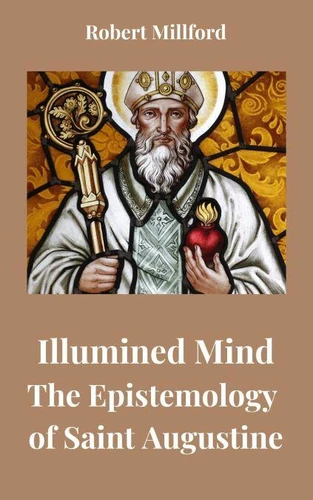Illumined Mind: The Epistemology of Saint Augustine
Par :Formats :
Disponible dans votre compte client Decitre ou Furet du Nord dès validation de votre commande. Le format ePub est :
- Compatible avec une lecture sur My Vivlio (smartphone, tablette, ordinateur)
- Compatible avec une lecture sur liseuses Vivlio
- Pour les liseuses autres que Vivlio, vous devez utiliser le logiciel Adobe Digital Edition. Non compatible avec la lecture sur les liseuses Kindle, Remarkable et Sony
 , qui est-ce ?
, qui est-ce ?Notre partenaire de plateforme de lecture numérique où vous retrouverez l'ensemble de vos ebooks gratuitement
Pour en savoir plus sur nos ebooks, consultez notre aide en ligne ici
- FormatePub
- ISBN8227028273
- EAN9798227028273
- Date de parution27/09/2024
- Protection num.pas de protection
- Infos supplémentairesepub
- ÉditeurBig Dog Books, LLC
Résumé
This book explores the profound philosophical and theological insights of Saint Augustine regarding the nature of knowledge, truth, and the role of divine illumination in the human quest for understanding. Rooted in both Christian doctrine and Platonic philosophy, Augustine's theory of knowledge emphasizes the essential relationship between faith and reason, as well as the necessity of divine grace in guiding the intellect toward eternal truths. Through an analysis of Augustine's key works, including Confessions, De Trinitate, and De Magistro, the book traces the development of his epistemology, focusing on his critique of sensory knowledge and his elevation of intellectual knowledge, which transcends the material world.
Augustine's famous theory of divine illumination is presented as the cornerstone of his thought, where God is understood as the ultimate source of truth, and human reason is only capable of true knowledge when enlightened by God's grace. The book also examines Augustine's lasting influence on medieval philosophy, particularly through figures like Anselm of Canterbury and Bonaventure, and his enduring legacy in modern and contemporary philosophy, including existentialist thinkers like Søren Kierkegaard and developments in phenomenology and the philosophy of mind.
Augustine's profound integration of faith and reason offers a framework for understanding knowledge that continues to resonate in debates about the limits of human intellect, the nature of self-awareness, and the rationality of religious belief. By engaging with Augustine's philosophical journey from skepticism to Christian faith, Illumined Mind presents a compelling study of how the search for truth is, at its core, both an intellectual and spiritual endeavor, ultimately leading to the knowledge of God through divine illumination.
Augustine's famous theory of divine illumination is presented as the cornerstone of his thought, where God is understood as the ultimate source of truth, and human reason is only capable of true knowledge when enlightened by God's grace. The book also examines Augustine's lasting influence on medieval philosophy, particularly through figures like Anselm of Canterbury and Bonaventure, and his enduring legacy in modern and contemporary philosophy, including existentialist thinkers like Søren Kierkegaard and developments in phenomenology and the philosophy of mind.
Augustine's profound integration of faith and reason offers a framework for understanding knowledge that continues to resonate in debates about the limits of human intellect, the nature of self-awareness, and the rationality of religious belief. By engaging with Augustine's philosophical journey from skepticism to Christian faith, Illumined Mind presents a compelling study of how the search for truth is, at its core, both an intellectual and spiritual endeavor, ultimately leading to the knowledge of God through divine illumination.
This book explores the profound philosophical and theological insights of Saint Augustine regarding the nature of knowledge, truth, and the role of divine illumination in the human quest for understanding. Rooted in both Christian doctrine and Platonic philosophy, Augustine's theory of knowledge emphasizes the essential relationship between faith and reason, as well as the necessity of divine grace in guiding the intellect toward eternal truths. Through an analysis of Augustine's key works, including Confessions, De Trinitate, and De Magistro, the book traces the development of his epistemology, focusing on his critique of sensory knowledge and his elevation of intellectual knowledge, which transcends the material world.
Augustine's famous theory of divine illumination is presented as the cornerstone of his thought, where God is understood as the ultimate source of truth, and human reason is only capable of true knowledge when enlightened by God's grace. The book also examines Augustine's lasting influence on medieval philosophy, particularly through figures like Anselm of Canterbury and Bonaventure, and his enduring legacy in modern and contemporary philosophy, including existentialist thinkers like Søren Kierkegaard and developments in phenomenology and the philosophy of mind.
Augustine's profound integration of faith and reason offers a framework for understanding knowledge that continues to resonate in debates about the limits of human intellect, the nature of self-awareness, and the rationality of religious belief. By engaging with Augustine's philosophical journey from skepticism to Christian faith, Illumined Mind presents a compelling study of how the search for truth is, at its core, both an intellectual and spiritual endeavor, ultimately leading to the knowledge of God through divine illumination.
Augustine's famous theory of divine illumination is presented as the cornerstone of his thought, where God is understood as the ultimate source of truth, and human reason is only capable of true knowledge when enlightened by God's grace. The book also examines Augustine's lasting influence on medieval philosophy, particularly through figures like Anselm of Canterbury and Bonaventure, and his enduring legacy in modern and contemporary philosophy, including existentialist thinkers like Søren Kierkegaard and developments in phenomenology and the philosophy of mind.
Augustine's profound integration of faith and reason offers a framework for understanding knowledge that continues to resonate in debates about the limits of human intellect, the nature of self-awareness, and the rationality of religious belief. By engaging with Augustine's philosophical journey from skepticism to Christian faith, Illumined Mind presents a compelling study of how the search for truth is, at its core, both an intellectual and spiritual endeavor, ultimately leading to the knowledge of God through divine illumination.









